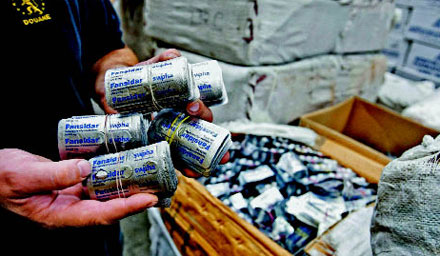Intellectual Property Watch | 6 April 2010
Risk of wrongful medicines seizures seen in EU-Central America trade deal
By David Cronin for Intellectual Property Watch

A new accord designed to bolster political and economic ties between the European Union and Central America could result in greater seizures of medicines whenever pharmaceutical companies allege that their patents have been infringed, public health advocates have warned.
The EU is pushing for robust intellectual property clauses to be inserted in the “association agreement” under negotiation between the 27-country bloc and six Central American nations: Costa Rica, Guatemala, El Salvador, Honduras, Panama and Nicaragua.
The Union’s executive arm, the European Commission, has acknowledged that the measures it is seeking will include clauses requiring customs authorities to impound consignments of goods when violations of IP standards occur.
According to John Clancy, the Commission’s trade spokesman, “these provisions only refer to counterfeit goods – for example, fashion goods, computers, phones, or pirated CDs or movies.” Clancy added that the relevant clauses will not deal with infringements of patents “and would therefore not hamper the production or trade in generic drugs.”
But campaigners on access to medicine issues have argued that the provisions could be interpreted in a way that would lead customs authorities to put the brakes on deliveries of generic medicines in cases where large drug companies allege that patents have not been respected. A copy of the agreement was not available at press time.
Sophie Bloemen from the organisation Health Action International, said she was “very worried” about the possible implications that the proposed agreement could have on the supply of affordable medicines to Central America’s poor. She argued that the Commission’s efforts to introduce criminal penalties for IP violations into the agreement went beyond the mandate that had been given to it by the EU’s governments, before the trade talks commenced in 2007.
Public health advocates point out that the provisions which the EU is seeking appear similar to those contained in customs rules applying within the Union since 2003. During 2008 and early last year, these rules were invoked at least 18 times to seize generic medicines by customs officials. The Dutch authorities, for example, blocked the transit of Indian-made drugs required to treat AIDS patients in Nigeria and high blood pressure in Brazil, reportedly after major pharmaceutical companies complained that their patents had been infringed. These rules are also additional to those contained in the World Trade Organisation’s Trade-Related Aspects of Intellectual Property Rights (TRIPS) agreement, according to analysts.
Alexandra Heumber, a Brussels campaigner with the humanitarian aid group Médecins sans Frontières (Doctors without Borders), welcomed steps taken by the Commission to review EU customs rules following the seizures of medicines. These steps include a consultation process, in which concerned individuals or organisations can submit recommendations. “But this doesn’t mean the issue has been sorted out,” Heumber said. “There is a lot of paradox. They [EU officials] tell us they don’t want to hamper access to medicines but at the same time they are pushing for provisions [in trade agreements] that would hamper access to medicines. There is no recognition of this.”
David Hammerstein, a former member of the European Parliament who now works as an independent consultant on health and IP matters, argued that there is a lack of coherence between the EU’s stated commitment to the United Nations’ Millennium Development Goals of reducing extreme poverty by 2015 and the Union’s trade policies.
“While the EU’s left hand works to reach the millennium goals by funding development programmes more than anyone, the right hand of the EU is pushing free trade agreements that extend the monopoly over medical patents and impose tough border enforcement measures that go beyond the legal demands of international law and that end up reducing access to essential medicines,” Hammerstein told a recent conference in Brussels.
A spokesman for the European Federation for Pharmaceutical Industries and Associations, the main group for major drug companies in this continent, was unable to comment.
Brussels officials have signalled that they wish to have both sides approving the contents of the association agreement in time for a summit between EU and Latin American leaders in Madrid this coming May. Two rounds of negotiations aimed at finalising a deal are scheduled to take place during April.